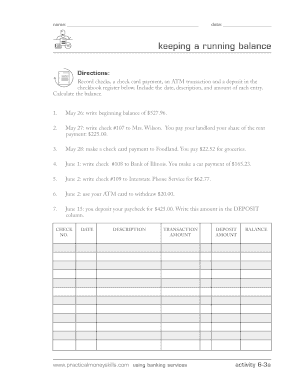


As a result of this arrangement, the balance of any checks written against the Disbursement Account at the end of a reporting period that we have mailed to our vendors, but that have not yet been presented by our vendors for payment (“Outstanding Checks”), represents a “book overdraft” of the Disbursement Account. Pursuant to our banking arrangements, through automated transfers between the Disbursement Account and another depository account at the same bank (the “Funding Account”), the closing bank balance of the Disbursement Account on any given day is zero. Generally, we pay our vendors from a “zero-balance” controlled disbursement account (the “Disbursement Account”). Please refer to our response to the Staff’s comment “Please tell us what consideration you gave to filing an Item 4.02 Form 8-K regarding non-reliance on previously issued financial statements” below for our evaluation of materiality with respect to this error. We believe this revision provides investors and other financial statement users with a higher degree of transparency and enhanced comparability between periods and represent appropriate remediation of an immaterial error. We elected to revise the fiscal 2012 and fiscal 2011 financial statements included in our 2013 Form 10-K to conform to the new presentation of outstanding checks as of February 1, 2014, although in our opinion such revision was not required due to the conclusion we reached with respect to materiality. Further, we note the disclosure guidance in ASC 250 applies to the correction of errors in previously issued financial statements however, in practice the term “revision” is commonly used to describe errors that are not material. Moreover, we believe that the nature and extent of the disclosures included in our 2013 Form 10-K indicate to a reader that we considered this to be an error in our prior financial statements. Prior to the filing of our 2013 Form 10-K, we carefully considered the guidance in ASC 250-10-50-7 and determined that the use of the word “revision” in our disclosures was an appropriate proxy for the word “error” as that term is defined under the accounting guidance. BDO reviewed the revisions to our fiscal 20 financial statements included in the 2013 Form 10-K and concluded that the revisions were not material and, consequently, BDO determined that dual-dating of BDO’s prior audit report was not required. Based upon its performance of the foregoing procedures, BDO determined that the date of the BDO opinion pertaining to our fiscal year 2012 financial statements did not need to be changed from the original issuance date of April 2, 2013.


Accordingly, BDO performed procedures to reissue their opinion as required by AU-C 560.19 (PCAOB Interim AU section 508.71-73) and evaluated the changes to our consolidated financial statements under AU-C 560.15 (PCAOB Interim AU section 561.04-05) and AU-C 700 (AS 6 and PCAOB Interim AU section 530.01-02). As a result of the conclusions reached in connection with the re-evaluation of our accounting for and presentation of outstanding checks described more fully in our response to the Staff’s comment #2 below, we communicated to BDO our intention to revise the fiscal year 20 consolidated financial statements such that those financial statements would be presented on a basis consistent with our 2013 consolidated financial statements. Our fiscal year 20 consolidated financial statements were audited by BDO USA, LLP (“BDO”).


 0 kommentar(er)
0 kommentar(er)
